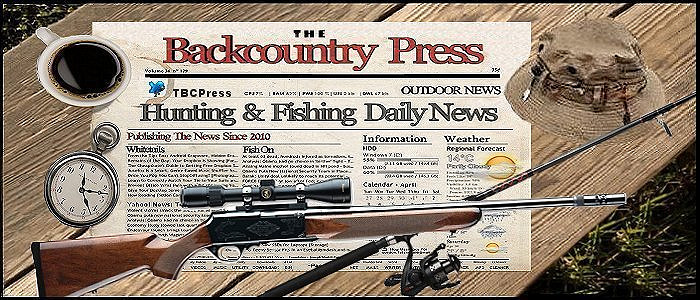The country's premier hunting and fishing daily news
The Backcountry Press
The Backcountry Outdoor News reports the latest hunting & fishing news along with fishing derbies & tournaments
from:
| ||||||
| ||||||
|
© 2010 Backcountry Press Outdoor News - All Rights Reserved
BACKCOUNTRY PRESS is the country's premier daily hunting, fishing & outdoor news in the USA, Canada and more. Read whats happening in your neck of the woods & beyond.
For those who provide updated information in the field of hunting & fishing, please don't hesitate to contact us to get
your articles added to our site.
Loading
Article A16-2009
Disclaimer: The views expressed on this site are that of the authors and not necessarily that of The Backcountry Press Outdoor News
Connect With Us
Angler & Hunter Tips On Staying Smart in Bear Country
Submitted by: Backcountry Press Outdoor News
Posted on: 05/13/16
Anglers and hunters need to be extra cautious while recreating in bear country. Because they are often moving quietly, they are at higher risk of surprising bears while they are in the field.
Nothing will guarantee your safety in bear country, but knowledge of bears and proper behavior greatly reduce your risk. Here is some information to help both from a bad encounter.
ANGLERS
Some bears are more tolerant of people than others. Every bear has its own comfort zone. If you are fishing on the same river as a bear, chances are they may wish to fish in the same spot as you.
Not to worry, rivers can usually provide enough bank access for both humans and wildlife to fish; you may just have to move up or down stream. It is very important to remember not to crowd bears, or become complacent or negligent around bears.
Should you encounter a bear, give it plenty of space. Stop, stand your ground, and decide if you can get to a safe place. If you can, always increase the space. If the bear doesn’t see you, leave the area and try to watch the bear.
If the bear sees you, identify yourself by waving your arms and calmly talk to the bear. While fishing with others stay close together; there’s safety in numbers. Whenever you can do so safely, increase the personal space between you and the bear
If a bear approaches you while you are fishing, there are several things to keep in mind.
Splashing fish attract bears. If you have a fish on your line and a bear approaches, cut your line or give the line some slack to stop the splashing. Never let a bear take anything away from you. It may cause the animal to further associate people and food. If a bear attempts to take fish from you, surrender your catch to the fast moving current.
Store all scented items in bear-resistant containers. Remember that your waders, vest, and clothes may smell fishy too!
Keep your eyes open! There are several tell-tale signs that bear traffic around the corner may be inevitable. Watch for bear tracks, fresh scat, trails and disturbed rocks. You may see many birds gathered on the ground or in trees and bushes. In Alaska, that can mean something in the area is dead and the birds are feeding on it, along with potential bears. There may or may not be any foul odors associated with a bear kill. Bears may actively and aggressively protect a kill, so be aware, keep your eyes open and try to avoid such situations.
To lower your risk of a negative interaction while in bear country, try to travel during daylight hours, make noise, and avoid what is called “tunnel vision.” Keep a sharp eye to the bushes, upstream, downstream, and behind you at all times. While fishing, it is hard to keep an eye to your back, however, you will want to stop on occasion and look around. Avoid places where geographic factors, such as heavy cover, prevent you from seeing what’s ahead. Be alert in noisy areas where the sound of running water may prevent you from hearing bears, and bears from hearing you in the brush.
Should you choose to use defense tactics in the event of an attack (sprays, guns), you should know how to use your defense mechanism. There are many forms of defense tactics to use on bears. Common sense is the most effective. Avoidance and awareness will decrease your risk of a negative encounter in bear country.
HUNTERS
Hunters, especially, must take special care to avoid potentially dangerous confrontations with bears while they are dressing game.
Always carry and use bear pepper spray as the first line of defence – even if you’re carrying a gun. If you come across a bear while hunting other game, make every attempt to resolve the situation non-lethally. Shooting at a bear often kills or wounds an innocent animal, and a wounded bear may become aggressive.
Although common sense might suggest that guns would provide greater personal protection than bear pepper spray, research and experience indicate the opposite is true. Human-bear encounters involving firearms are more likely to result in injury to humans and bears. The evidence suggests that law enforcement agents and experienced hunters who use firearms to defend themselves suffer injury about 50 per cent of the time, while people defending themselves with bear spray escape injury most of the time and the injuries that occur are less severe (U.S. Fish and Wildlife Service).
Once you have killed your game, remove the carcass as quickly as possible from the site and let others in the area know there is game residue present. If you have to leave a game carcass over night, use of a portable electric perimeter fence can help detour bears and other large wildlife. Make sure it is well out in the open. Approach the site very carefully when retrieving your game the next day. Do not try to shoot out the situation if a bear has taken over your kill. It is illegal (in most states and provinces) to shoot a bear in defence of a game carcass.
======================================================================
Like all backcountry enthusiasts, hunters and anglers must keep a clean camp and secure potential attractants where bears can’t get at them. Because hunting and fishing camps often contain large quantities of meat and fish, portable electric fencing is highly recommended.
Spring when hungry after leaving hibernation & early fall when frantically fattening up for the winter is the most likely time for hunters – fishermen – hikers, campers or other outdoors-minded folks – to encounter bears
For more on Hunter Safety visit: http://www.tbcpress.com/Hunter-Safety.html
You can also find more information, in a copy of Living with Predators Resource Guide: Recreating in Bear, Wolf and Mountain Lion Country. The guide contains information on recreating in wild areas (including a special section for hunting in bear country); securing your food, garbage and other gear; and deterring predators.
Article resource information from: http://www.bearsmart.com – US Fish & Game Service and http://www.adfg.alaska.gov/














